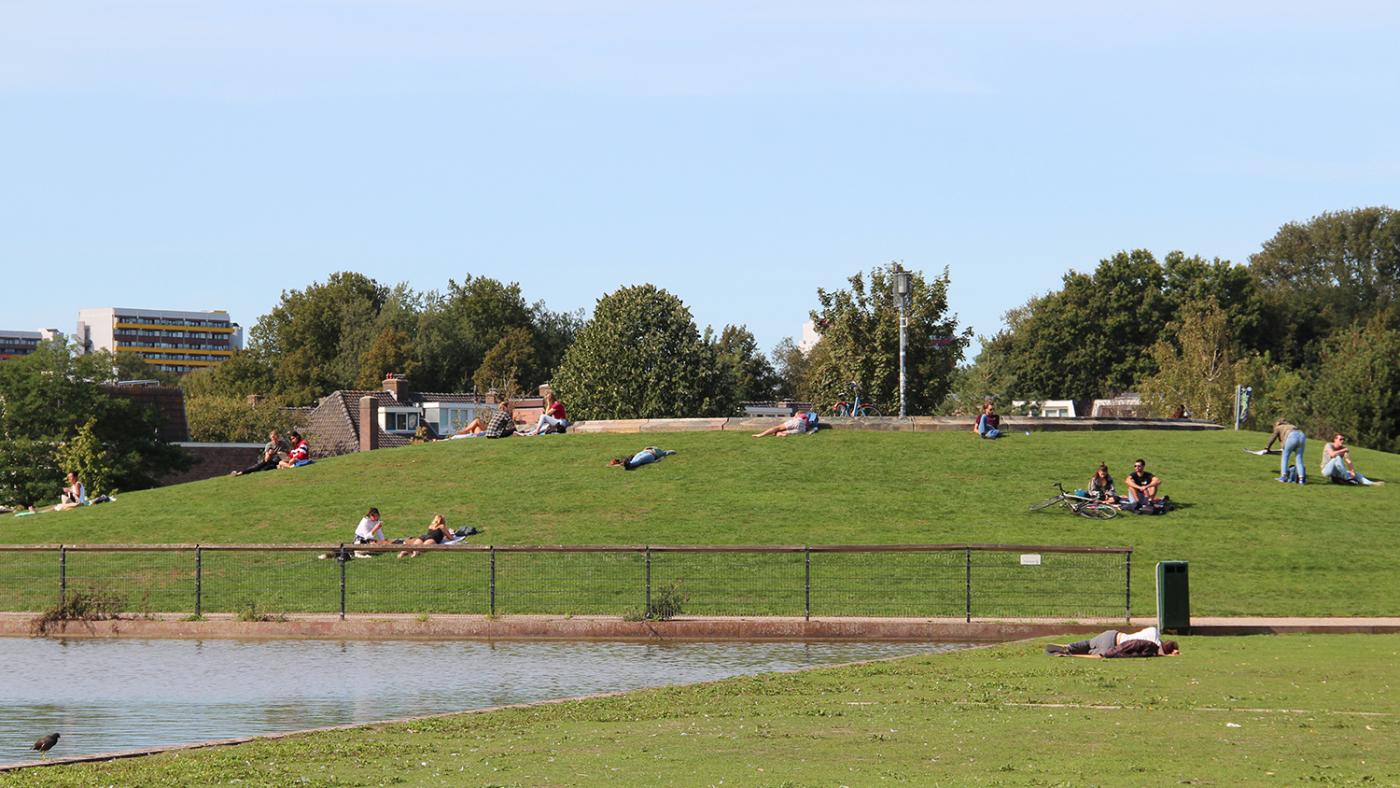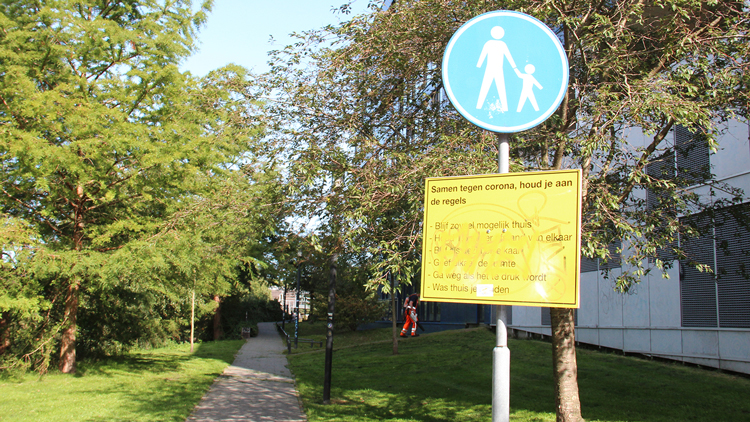Careless with corona rules: ‘My mental health is more important’

In the home of a biology student at the Ina Boudier Bakkerlaan, the residents are strict after a small corona outbreak happened a few weeks ago. Three housemates were infected, and the entire house was quarantined for two weeks. “We don’t want a repeat of that. So we agreed that visitors other than partners were only allowed in the living room with two at a time, and you’re only allowed two visitors at the same time in your own room. Furthermore, guests have to clean the surface areas of the bathroom.”
In a ten-person unit at student housing complex De Sterren, housemates have agreed to a set of rules: a maximum of two visitors are allowed. Resident Lisa has another reason for being strict. In the beginning of the lockdown, residents of another house at the complex were fined because the housemates were too close together. She then went to her parents’ house. “I need a Certificate of Good Conduct for my job.” A fine means a note on a criminal record, which means it can be more difficult to procure that certificate.
She recently returned to Utrecht, where the number of infections increases every day. A report from the GGD Utrecht Region from September 16 showed that a total of 618 infections were registered in the past week. Of those infections, around 35 percent happened among young people – a week before, that was 40 percent of a total of 425 registered infections.
After a few beers, you forget the rules
Although Utrecht isn’t the biggest hotbed of the four largest cities, nor of the country’s college towns, club Poema had to close its doors for two weeks because it hadn’t been following the corona rules. The mayor of Utrecht, according to RTV Utrecht, recently had a meeting with the USC fraternity. During an interview night for a room, the corona rules were not followed, after which at least one corona infection took place. The fraternity has now banned its members from organising house parties, and has pointed out the social responsibility to its members.

The students DUB spoke to for this story are happy that cafés and restaurants are open. They think it’s generally doable to stick to the rules there. “When you make a reservation, they remind you of the rules, which is a clear reminder, and helps you pay attention.” They’re also making sure to follow the rules so they don’t get the owners of their favourite haunts into trouble, although… “you forget about that after a few beers, because you’re just with your friends again after all that time.”
The students, all of them in their early twenties, indicate that it’s often unintentional when they don’t follow the rules. Sometimes, it’s just tricky. In the supermarket when it’s crowded, for instance, says the IBB biology student. “In our supermarket, you have to disinfect the carts yourself, and not everyone does that. It’s almost impossible to keep your distance.” A Master’s student of Artificial Intelligence doesn’t make a big deal out of it. “Everyone in the supermarket understands that at times, there’s just tiny bit of a lack of space. And I haven’t seen any data that indicates infections may be caused by a single breath in someone’s direction.”
If you’re having fun with someone, you don’t want to tell the other person to stand a little farther away
Even at the university, where each student has their own table, and the next one is at a sufficient distance, there are moments to stand too closely together, or for some civil disobedience. “After class, you want to chat for a while, but you don’t want to have to shout at each other.” And although most places have established one-way walking routes, the arrows are regularly ignored. “If there’s no one in the building, I’m not paying attention to the routes. The way the routes are designed, you have to walk an extra two kilometres to find a bathroom. Once it gets busier, I’ll follow the arrows.”
Although bus stops are nowhere near as crowded as they’d been before corona, you do sometimes meet people you want to chat with. It also feels safe because you’re outdoors, say students waiting at the bus stop at the Heidelberglaan. One of them compares it to smoking. “Some smokers light up outside, but never indoors. It’s the same with talking; if you’re having fun with someone, you don’t want to tell the other person to stand a little farther away. You tolerate it, like the friend who lights up a cigarette while you’re chatting.”
For a Master’s student of Law, the inconsistency of the rules play a role in their decision not to follow them too literally: “In the beginning, I always followed all the rules, but once regular life started again, it became less and less. I thought: if I have to work in a shop full of customers, I can also have a drink in the park with a group of ten people. I also feel the measures aren’t enforced equally, so that makes it harder to take them seriously. I do follow the rules when I’m visiting my grandfather or grandmother. You do want to protect people in an at-risk group.”
Other students agree. They want to prevent infecting their parents or grandparents. Students who don’t visit their parental homes as often, tend to feel less like they have to pay close attention to the rules; after all, they’re only endangering themselves. And even then, infection isn’t a big fear: “I’ve already had it, so I don’t follow the rules too closely; the chances of getting it again are slim."
Even in the park, with all the space there is, things don’t always go right
Most students admit that keeping one’s distance is most difficult among friends. A Bachelor’s student of Biology says: “Usually, we do inform each other that we’re not sick, and we assume that if you are, you don’t come. It’s kind of your own responsibility not to show up when you’re feeling ill.” A Master’s student of Youth Studies: “I do try to follow the rules, but I’ve noticed I’m not always doing so. When friends come over to have dinner at my place, for instance, where there’s limited space. But also in the park when we’re having association drinks, where there’s all the space in the world, it doesn’t always go right.”
A journalism student who thinks it’s fine to hug someone or stand close to another person if the other person is all right with it too, says: “In groups, I eventually let myself go, too. And you don’t want to be the one to shout: ‘Keep your distance, everyone! That’s not a metre and a half!’ That would make you very unpopular.”
Missing friends and physical contact seem to be the biggest reason not to stick to the minimum distance rule. Many students went back to their parents’ house at the start of the corona crisis. But now that the academic year has started again, and some have in-person classes, most have returned to their student housing. And friends make living on your own a lot less lonely. “I think my mental health is more important right now,” says the Master’s student of Artificial Intelligence. “Because it’s vulnerable when I’m seeing very few people and doing very few things, like exercising. Falling ill with the coronavirus would have less of an impact on my mental health.”
With thanks to Noortje van Bentum